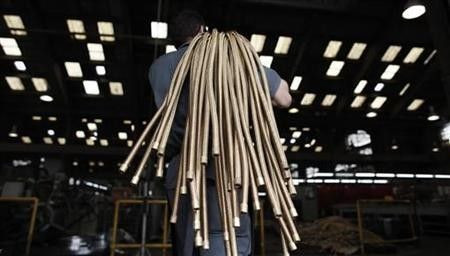Commodities Take Bearish Turn After Early-Monday Rally Fizzles
The fundamental things apply

Commodity prices posted a brief rally on Monday after a pro-austerity party got the most votes in Greece's weekend elections, but the upswing fizzled almost as soon as it began, confounding traders who might have expected developments to lift risky assets for at least a few sessions.
Buying momentum into commodities futures -- lifted by Greek election results that are generally seen as making it less likely that country will prompt a collapse in the European common currency model -- turned around before the markets in New York and Chicago even opened, as traders' attention went back to weak macroeconomic signs elsewhere.
The battle has been won, but the war is far from over, Commerzbank analyst Eugen Weinberg told Reuters. That's what the markets seem to be looking at this morning already, with the rally proving to be very short-lived. One would have expected it to last for at least the next couple of days.
Industrial metals, including copper, agricultural futures and energy-linked assets, had all risen at the beginning of trading sessions in Asia but were sharply off the day's highs by mid-morning in New York. Displaying a reverse trend, early paper losses in gold and other precious metals were nearly erased by the middle of the day in Europe, as investors piled into the assets as a safe haven.
Copper futures, considered a bellwether for industrial metal commodities -- and, hence, somewhat of a bellwether on the future of the global economy -- were the first to signal Monday's party would be short-lived, coming off three-week highs early in the day to recently trade at $3.3855 per pound in Chicago, up a negligible amount from Friday's settlement price.
The price of copper was dinged by various fundamentally bearish signals, including data from the Commodity Futures Trading Commission showing traders had extended their short positions on the metal last week, reporting the largest number of net short holdings since March of 2009.
Even more importantly, traders fear demand from China, the world's largest consumer of copper, will decline as its overall economy slows down.
Whenever we get a respite from macroeconomics, we turn to fundamentals and worry about sluggish Chinese copper demand, Orient Futures derivatives director Andy Du told Reuters.
Moving similarly to metal futures, crude oil contracts rose early in the day only to fall into the red as the global trading session moved into Western time zones.
Oil futures, which are more exposed to geopolitical developments, were being bought and sold in nervous trading as investors looked to upcoming talks in Russia between Iran and several major world powers, regarding Iran's nuclear program. Should talks fail, a U.S.-led blockade of Iranian oil exports, which is causing higher prices, would intensify in several weeks as oil shipment insurers would be banned from covering cargo coming out of Iran.
Any outcome will likely rattle the futures market.
Because the risk premium has now been entirely eliminated, the oil price is likely to respond by rising more sharply if the talks fail than it would fall if a breakthrough were achieved, a report from Frankfurt-based Commerzbank read on Monday.
In midday New York trading, a barrel of crude oil was down 1.63 percent to $82.66.
At the other end of the commodities trading spectrum, gold recovered from a steep drop early in the day, leading precious metals futures nearly back into positive territory.
Comex contracts for August delivery, the most widely traded monthly contract for gold, was going for $1,626.30 per ounce, down $1.80, from the previous session's close. Gold, which has regained its status as a safe-haven investment in recent weeks, is expected to react to policy developments later in the week, including any announcement from a G-20 meeting currently underway in Mexico and a much-expected decision following the two-day meeting of the U.S. central bank's policy-making arm later in the week.
This week, trading conditions could become more erratic despite the Greek election outcome. Last week's performance was mainly driven by mounting expectations for further monetary easing. This week, the FOMC meeting might disappoint market participants, Credit Suisse said in a note.
© Copyright IBTimes 2025. All rights reserved.





















